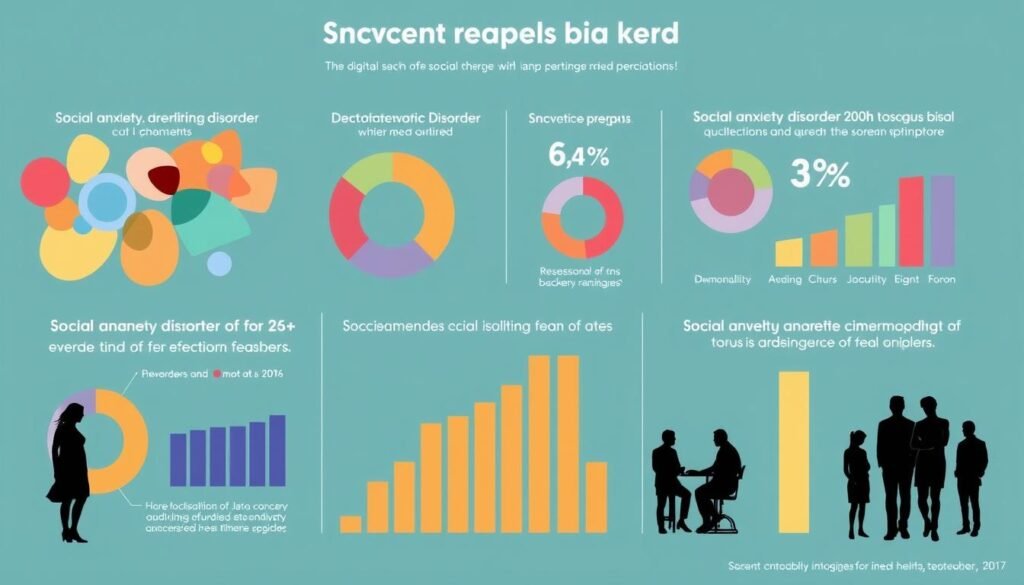Nearly 50% of people with anxiety say it harms their work quality. This shows how deep the effects of anxiety go in work and relationships. Anxiety fills people with constant worry and tension. It makes work and social life very hard.
People face many challenges when anxiety gets in the way at work and in personal life. They struggle with deadlines and keeping up relationships. Anxiety makes it tough to stay focused and do well at work. Knowing about these effects helps create better work and social settings. It helps people do more than just get by.
Key Takeaways
- Anxiety disorders affect nearly half of workers, impacting their work quality.
- Common issues for individuals with anxiety include difficulty in managing relationships and deadlines.
- Stress that disrupts daily functioning may indicate a more serious anxiety disorder.
- Effective management strategies include seeking help and practicing time management.
- Therapy and lifestyle changes can significantly improve the handling of anxiety.
- Understanding and compassion in the workplace can foster a healthier environment.
The Nature of Anxiety and Its Symptoms
Anxiety disorders are mental health issues that cause a lot of fear and worry. They make everyday life hard to handle. People with anxiety face many symptoms that can mess with their happiness and how well they do things.
Defining Anxiety Disorders
Anxiety disorders include several types, such as Generalized Anxiety Disorder (GAD) and Panic Disorder. There’s also Social Anxiety Disorder and Substance-Induced Anxiety Disorder. Each type has its own set of problems. GAD makes people worry about many things, even small tasks. Panic Disorder causes sudden fear attacks. Social Anxiety Disorder makes social events scary because of fear of judgment. Substance-Induced Anxiety Disorder happens because of drugs or stopping them, which adds more issues to anxiety.
Common Anxiety Symptoms Affecting Daily Life
People with anxiety show many signs that change how they live. The most common anxiety symptoms are:
- Rapid heart rate
- Lightheadedness or dizziness
- Physical muscle tension
- Excessive worry about ordinary situations
- Difficulty concentrating
- Avoidance of social interactions
- Sleep disturbances
These signs lead to big problems. They make it hard to do well at work and to keep up friendships. The effects on daily life can make someone feel alone. This happens because they stay away from others to handle their worry. It’s important to deal with these symptoms to feel better and enjoy life again.
Understanding how Anxiety Interferes with Work and Social Life
Anxiety greatly affects our work and social life. At work, people with anxiety have trouble staying focused. This affects their performance. Many reasons can cause anxiety to rise.
Impact on Workplace Productivity
Anxiety can lower creativity and decision-making skills. People may avoid joining in on team discussions or projects. This leads to an impact on productivity. Anxiety symptoms include a lack of confidence. This makes teamwork hard and lowers team spirit.
Challenges in Social Interactions
In social settings, anxiety can make people pull back from talking or networking. They might fear being judged and thus avoid interactions. This can make it hard to make new friends or advance in careers. Networking is key for career growth.
About 5% to 10% of people worldwide have social anxiety disorder. This shows how widespread the issue is. It affects work and personal life. Often starting before age 20, it makes socializing tough. Learning about this disorder can help improve work and social life. Check this detailed guide on social anxiety disorder for more info.
Workplace Anxiety: Causes and Effects
Workplace anxiety is shown through different triggers that badly affect someone’s mental state and their work. Knowing these triggers, along with their effects, is crucial for workers and bosses alike.
Common Triggers of Workplace Anxiety
Many things cause workplace anxiety. High demands, not feeling secure in your job, and conflicts with others are top reasons. When bosses don’t offer support, it makes stress worse. Over 41 percent of workers say they feel more anxious at work, and 90 percent say work stress impacts their mental health.
Consequences of Workplace Anxiety on Job Performance
Anxiety’s effects go beyond just one person. About 56 percent of workers say anxiety hits their job performance hard. Those struggling with anxiety might find it hard to focus. This leads to missing deadlines and making more mistakes. Also, 50 percent believe anxiety lowers the quality of their work.
Anxiety also hurts workplace relationships, with 51 percent saying it does. This issue is big, impacting personal well-being, organizational success, and how teams get along. For more on dealing with performance anxiety, visit understanding performance anxiety.
Social Anxiety Disorder and Its Influence
Social anxiety disorder (SAD) is more than just shyness. It involves intense fear in social situations where others might judge you. People with this condition find daily tasks challenging. They may avoid social events, work meetings, and even small talks.
What is Social Anxiety Disorder?
At its core, social anxiety disorder involves fearing negative judgment in social settings. Symptoms can include a rapid heartbeat, sweating, trembling, and nausea during social activities. This often leads to avoiding social situations. This avoidance can increase feelings of loneliness. About 15 million adults in the United States suffer from SAD, as per the National Institute of Mental Health.
Statistics on Social Anxiety and its Prevalence
Recent studies reveal interesting facts about social anxiety. For example, research with over 11,000 participants showed that those with social anxiety have fewer close friends. They also spend less time with family, worsening their anxiety and depression. In colleges, students with social anxiety often skip social events. This affects both their social life and studies.

The statistics highlight the need to address social anxiety disorder seriously. Treatments like cognitive behavioral therapy (CBT) and mindfulness can help manage symptoms. By understanding these statistics, we can provide better support and reduce the stigma around social anxiety.
The Physical Impact of Anxiety on Health
Anxiety makes your body react in ways that can hurt your health. It mainly messes with your nervous system. This leads to both emotional and physical problems. Knowing how anxiety affects you can show the strong connection between your mind and body.
How Anxiety Affects the Nervous System
The nervous system plays a big role in feeling anxious. High anxiety can make your heart beat fast and muscles tense. You may face:
- Headaches
- Muscle tension
- Trembling
- Sweating
This means your nervous system is too sensitive and can’t relax. Your body stays on high alert, which makes health issues worse over time.
Long-term Health Consequences of Chronic Anxiety
Long-lasting anxiety can lead to major health issues. It can cause:
- Heart problems, like high blood pressure
- Stomach problems, like irritable bowel syndrome
- Weaker immune system
- Constant pain and headaches
People with lots of anxiety may also get depressed or other mental issues. Their immune system gets weaker, making them catch colds and flu more easily. Getting help is key. The right treatment can reduce these health problems and improve life quality.
Managing Anxiety in Work and Social Environments
To handle anxiety well, it’s vital to be active about it, especially at work and with friends. Using ways to reduce stress can really make life better. Activities like working out, eating right, and relaxing are key. Making these activities a regular habit helps manage anxiety and supports health overall.
Stress Reduction Strategies for Anxiety Management
Finding good ways to lower stress is crucial for keeping anxiety in check. Adopting these steps can lead to a more controlled and even life:
- Physical Activity: Regular exercises boost your mood and cut down stress.
- Nutrition: A well-rounded diet supports your mental and emotional health.
- Relaxation Techniques: Techniques like deep breathing, yoga, and visualization helps calm your mind.
- Time Management: Planning your time well can lessen stress and stop burnout.
Integrating Mindfulness Techniques into Daily Life
Mindfulness techniques are great for fighting anxiety. They help you stay in the moment, reducing stress. Here are some effective ways to practice mindfulness:
- Meditation: Daily meditation clears your mind and lowers anxiety.
- Deep-Breathing Exercises: Slow, deep breaths can calm you down and reduce stress.
- Mindful Observation: Using your senses to notice your environment brings calmness.
- Journaling: Writing down what you think and feel helps you reflect and release emotions.

Adding these stress-reducing and mindfulness practices to your life can greatly help manage anxiety. Doing so leads to a healthier lifestyle, better emotional balance, and improved productivity at work and in social life.
| Strategy Type | Examples | Benefits |
|---|---|---|
| Stress Reduction | Exercise, Relaxation | Improves mood, Reduces tension |
| Mindfulness Techniques | Meditation, Journaling | Enhances presence, Reduces overwhelming feelings |
Cognitive-Behavioral Therapy: A Helpful Approach
Cognitive-Behavioral Therapy (CBT) is a top choice for dealing with anxiety disorders. It uses a planned method to help people see and change negative thoughts. This process encourages actions that help reduce anxiety symptoms.
Understanding Cognitive-Behavioral Therapy
CBT is based on the idea that wrong thinking and learned behaviors cause mental issues. It focuses on solving present problems instead of exploring past issues. People in CBT go to sessions for about 12 to 16 weeks. They work on exercises to question and change their thinking and actions.
Studies show CBT significantly helps improve feelings and how people function. Research indicates that CBT leads to these positive changes.
Effectiveness of CBT in Treating Anxiety Disorders
CBT has been very successful in treating different kinds of anxiety, like generalized anxiety and social anxiety. One main CBT method, exposure therapy, lets people face their fears in a controlled way. This helps them stop avoiding scary situations. Usually, about 10 therapy sessions focus on these exposure tactics. They help people fight their fears and improve their lives.
Many experts prefer CBT as the initial treatment for anxiety. It’s often just as good as other treatments or medications. People practicing CBT learn to handle anxiety on their own. With guidance, they gain skills to take care of their mental health for the long term.
Developing Anxiety Coping Mechanisms
Building effective anxiety coping strategies is key for those who face daily challenges. These strategies help people become emotionally stronger and improve their life quality. There are various tips that can help manage anxiety better.
Practical Tips to Build Coping Strategies
Implementing certain strategies can make life with anxiety more manageable. Some effective tactics include:
- Setting achievable goals: Aim for small, realistic goals to feel successful.
- Practicing self-care: Do activities that boost your well-being, like exercising and sleeping well.
- Using creative outlets: Writing, drawing, or other creative activities can help express emotions and ease stress.
- Replacing negative thoughts: Keep a positive mindset by challenging negative thinking patterns.
- Gradual exposure to fears: Slowly facing your fears can help reduce the anxiety they cause.
Support Systems and Their Role in Coping
A strong support network is very important for coping with anxiety. Being connected with friends, family, or professionals gives emotional support and encourages facing fears. It helps people feel they belong and less alone.
Being part of support groups or therapy sessions lets people share their experiences. This can make them feel understood and supported in their fights. Support systems are crucial for developing coping skills and becoming more resilient against anxiety.

Creating a Healthy Work-Life Balance
Creating a healthy work-life balance is key for reducing anxiety and boosting well-being. Many people struggle to separate work from personal life. This struggle can raise stress levels, limiting leisure and personal time. Prioritizing mental health by finding balance helps manage stress better.
Importance of Work-Life Balance in Managing Anxiety
Chronic stress can seriously affect health. Over a quarter of Americans say they’re “super stressed.” This shows the urgent need for strategies to enhance well-being. A good work-life balance reduces stress, prevents burnout, and safeguards mental health. It makes everyday tasks more manageable.
Strategies for Achieving Work-Life Balance
To achieve balance, consider these actions:
- Set specific work hours to boost productivity.
- Take breaks during work to improve decision-making and lower stress.
- Enjoy regular leisure activities for personal growth and mental health.
- Create “no work” zones at home for better relaxation.
- Opt for flexible or remote work to increase loyalty and productivity.
- Listen to music at work to decrease blood pressure and ease stress.
- Promote open workplace communication to reduce pressure and build support.
Following these five steps can help check your balance: pause and reflect, monitor your feelings, reorder activities, look at alternatives, and adjust as needed. Building a strong support system is vital as individuals juggle responsibilities and mental health.
For more tips on a balanced lifestyle, check out this guide on improving your work-life balance.
Conclusion
Anxiety deeply affects work and social life. It brings big challenges for lots of people. Knowing how it can lower work status and harm relationships is key to tackle it.
To beat anxiety, understanding it and using good coping ways is crucial. These steps help a lot in dealing with daily anxieties.
One strong method to manage anxiety is cognitive-behavioral therapy. It gives people ways to fight anxious thoughts. Also, having a balanced work-life and good support makes mental health and happiness better. Creating strong bonds and focusing on mental health helps in facing life’s stresses.
Seeing anxiety signs early and getting help can improve school and work success. It also makes social bonds healthier. When we put mental health first, it’s good for us and makes work places and homes happier.